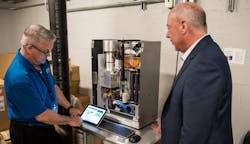BioFlyte Launches First-of-Its-Kind Biothreat Surveillance Pilot Program at Pittsburgh International Airport
BioFlyte, a bioaerosol surveillance firm with a disruptive new class of fieldable biological threat collection, detection and identification solutions, today announced a comprehensive pilot program with Pittsburgh International Airport (PIT) to utilize its fieldable mass spectrometer to add a new layer of safety for the airport.
BioFlyte’s BioTOF z200 bioaerosol identifier automatically collects and analyzes aerosol samples for biological and chemical threats with its state-of-the-art Matrix Assisted Laser Desorption/Ionization (MALDI) time-of-flight mass spectrometer. This new class of diagnostic tool incorporates robotics and AI/ML algorithms to continuously screen for more than 1,100 toxins, viruses and bacteria that could impact critical infrastructure with up to 95% accuracy. Each test, from collection to identification, is completed within five minutes – allowing operators and security teams to respond to threats more quickly and confidently than with any other technology on the market.
PIT’s xBridge innovation center partners with early-stage startups to develop and test new technologies that can positively impact airport security, customer experience, sustainability, operations and more. As a part of this pilot program, one of BioFlyte’s modules is stationed within the airport’s HVAC system to provide continuous, autonomous surveillance of the air moving through the terminals. If the device detects a dangerous airborne agent, it directly alerts operations staff and sends details about the potential threat for expedited investigation.
“This is the first time a biothreat surveillance technology of this caliber has been operationally introduced into this type of complex critical infrastructure,” said Todd Sickles, CEO, BioFlyte. “We are passionate about our national security mission and are excited to work with the xBridge team to confirm the timeliness and accuracy of our technology in a real-life, operational setting. We are confident that this pilot will lead to other opportunities for BioFlyte in not only the aviation market, but in other settings with complex critical infrastructure.”
BioFlyte and xBridge plan to expand the program and install multiple sensors and triggers throughout the airport while integrating directly with the PIT emergency management system.
“Safety, security and health are the top priority for us every single day,” said Cole Wolfson, Director, xBridge. “We’re very confident in our ability to maintain safe facilities and deploying BioFlyte’s technology takes that confidence to another level. We are a safer, better airport with them onboard.”
